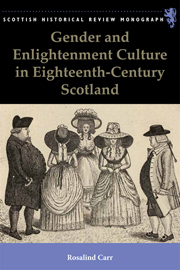Book contents
- Frontmatter
- Contents
- Acknowledgements
- List of Abbreviations
- Introduction: Gender and Scottish Enlightenment Culture
- 1 Masculinity, Homosociality and Intellectual Culture
- 2 Women and Intellectual Culture
- 3 Urbane and Urban Sociability in Enlightenment Edinburgh
- 4 Enlightened Violence? Elite Manhood and the Duel
- Conclusion
- Bibliography
- Index
2 - Women and Intellectual Culture
Published online by Cambridge University Press: 05 September 2014
- Frontmatter
- Contents
- Acknowledgements
- List of Abbreviations
- Introduction: Gender and Scottish Enlightenment Culture
- 1 Masculinity, Homosociality and Intellectual Culture
- 2 Women and Intellectual Culture
- 3 Urbane and Urban Sociability in Enlightenment Edinburgh
- 4 Enlightened Violence? Elite Manhood and the Duel
- Conclusion
- Bibliography
- Index
Summary
A partial presence
Women were neither entirely absent nor fully present in Scottish Enlightenment culture. It would be ludicrous to suggest that women existed in a cloistered domestic sphere, but it is also incorrect to assume that women's public presence equated to a sort of liberation. Women were never invisible in the Enlightenment, but their participation was constrained by gender. Significantly, their inclusion was dependent upon the performance of a femininity that acted to limit the extent of their participation. In Capital of the Mind (2003), a popular history of eighteenth-century Edinburgh, James Buchan asserts that ‘the eighteenth century was the women's century in Scotland’, citing the decline in religious superstition, improvements in public health, increased economic prosperity, and the emergence of domesticity. It is undeniable that certain aspects of eighteenth-century improvement benefited women, but it is a massive leap to claim that it was ‘the women's century’. As the previous chapter illustrated, Scottish Enlightenment intellectual culture was largely a male culture. Whatever the changes to a woman's social position in eighteenth-century Scotland, these did not empower her to fully participate in the century's epistemological revolution.
Complex analyses of the impact of the Scottish Enlightenment on women have been developed by feminist historians, and this chapter follows the groundbreaking work of scholars such as Jane Rendall, who has written extensively on women in Scottish Enlightenment ideology and women's place in intellectual and political life.
- Type
- Chapter
- Information
- Publisher: Edinburgh University PressPrint publication year: 2014



